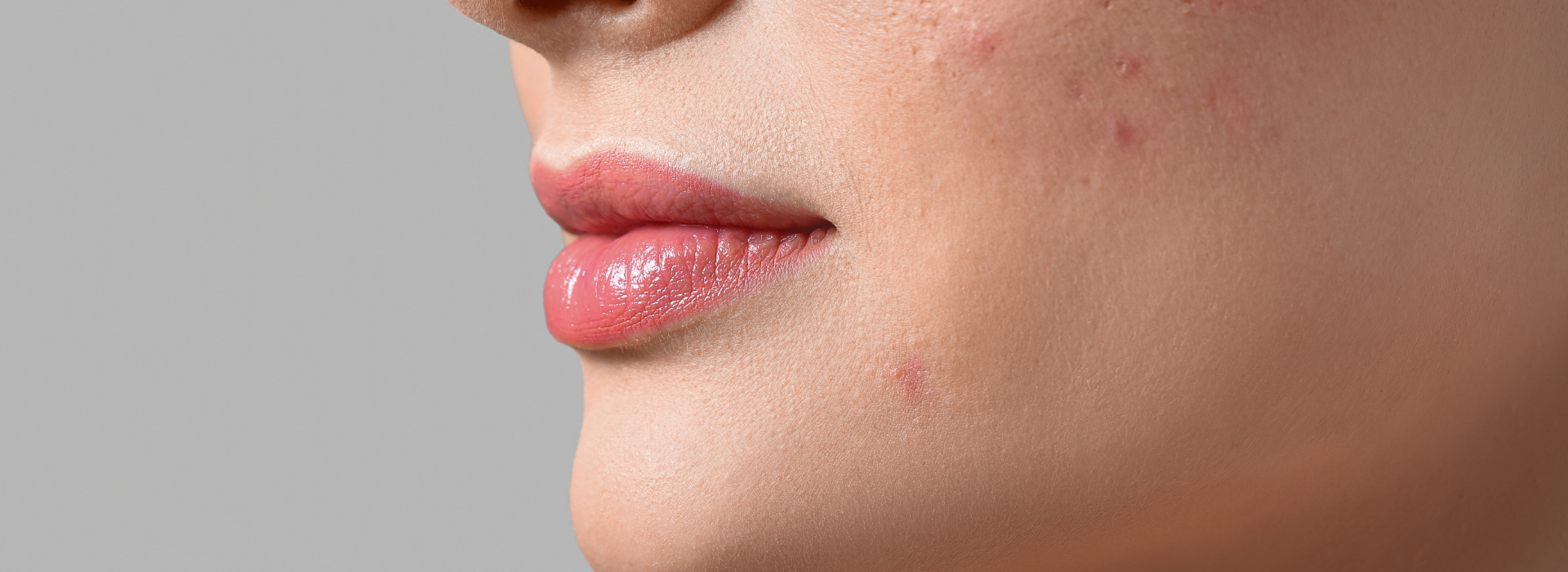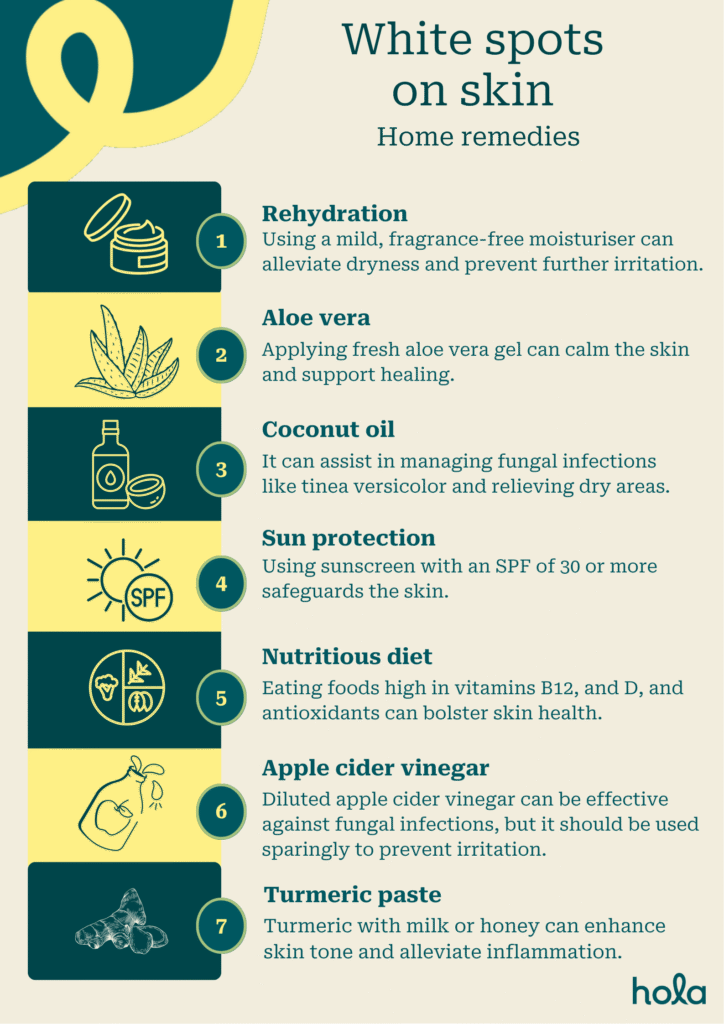White spots on skin: Possible causes and next steps
Written by the editorial staff writer at Hola. Medically Reviewed by Dr. Ammar AL-ANI, MBChB, CCBST, AMC.

Contents

Summary: White spots on the skin may arise from vitiligo, fungal infections, sun damage, or nutritional deficiencies like a lack of vitamin B12. While some instances may improve with home treatments like moisturisation and a healthy diet, persistent or spreading spots require medical evaluation. Although generally harmless, any alterations in size or texture should be assessed to eliminate the possibility of serious conditions.
White spots on the skin can be alarming, especially when they appear suddenly or last for an extended period. While they are usually harmless, they may occasionally indicate an underlying health issue. Understanding the causes of these white spots and how to proceed is important for managing the condition properly. Let’s explore the potential reasons for white spots on the skin, their symptoms, and what steps to take if they appear.
Common causes of white spots
White spots on the skin can result from various conditions, including autoimmune disorders, fungal infections, and sun damage. Identifying the cause is essential for proper treatment and management:- Vitiligo: This disorder arises when the immune system targets the cells responsible for skin pigmentation, resulting in white patches that may expand over time.
- Pityriasis alba: A prevalent skin issue, frequently seen in children and young adults, that leads to dry, scaly, and light-coloured patches, typically on the face, arms, or neck.
- Tinea versicolor: A fungal infection that alters the normal pigmentation of the skin, producing small white, pink, or brown patches, usually found on the chest, back, and shoulders.
- Idiopathic guttate hypomelanosis: Small, circular, white spots that develop in areas exposed to sunlight, primarily in older adults, due to prolonged sun exposure.
- Lichen sclerosus: A long-lasting skin condition that results in white, thin, and wrinkled patches, often affecting genital and anal regions, though it can manifest on other parts of the body as well.
- Post-inflammatory hypopigmentation: A reduction in skin pigment that occurs after inflammation, injury, or skin disorders such as eczema or psoriasis, resulting in either temporary or permanent white spots.
- Nutritional deficiencies: Lack of certain vitamins and minerals, particularly vitamin B12, vitamin D, and calcium, can sometimes lead to white spots on the skin.
- Sun damage: Extended exposure to sunlight can create white patches, especially in individuals with lighter skin, due to harm inflicted on the melanocytes.
Also read: Red spots on skin: Causes & when to worry?
Other potential causes
White spots on the skin can also be caused by less common factors, including genetic conditions, allergic reactions, and underlying health issues. Understanding these causes can help in seeking appropriate care:
- Nevus depigmentosus: An uncommon, stable birthmark characterised by diminished melanin production in a specific skin area.
- Chemical leukoderma: Contact with harsh chemicals, like those in hair dyes or rubber products, may result in depigmented spots on the skin.
- Leprosy: A bacterial infection that impacts nerves and skin, occasionally resulting in pale or white patches along with a loss of sensation.
- Sarcoidosis: An inflammatory condition that can produce white patches on the skin alongside other systemic symptoms.
- Autoimmune conditions: Specific autoimmune diseases, such as lupus or scleroderma, may lead to localised or widespread loss of skin pigmentation.
- Genetic disorders: Some hereditary conditions, like tuberous sclerosis or piebaldism, can cause white patches due to genetic alterations affecting melanin production.
Also read: Fungal skin infection: Types and home remedies - Hola Health
Feeling sick and unsure why? Speak with a GP online in 15 minutes.
When to see a doctor
Consult a doctor if white spots on your skin are growing, increasing in number, or accompanied by itching, pain, or changes in texture. Seek medical care if the spots appear suddenly without an apparent reason, persist despite home treatments, or are linked to other symptoms such as fatigue or neurological changes. If there’s a family background of autoimmune diseases, skin conditions, or unexplained pigment loss, a dermatologist can assist in identifying the cause. Furthermore, if the white patches lead to emotional distress or impact your self-esteem, a professional evaluation can offer reassurance and treatment options. Timely diagnosis is essential for conditions like vitiligo, fungal infections, or skin issues needing medical treatment.
Consult a doctor in minutes, 24/7 with Hola.
Home treatment
Home treatments can help manage white spots on the skin by improving hydration, reducing inflammation, and addressing underlying causes like fungal infections or nutrient deficiencies. Here are some effective home remedies to try, it is recommended to consult a doctor regarding these remedies:
- Rehydration: Consistently using a mild, fragrance-free moisturiser can aid in alleviating dryness and preventing further irritation, particularly in conditions such as pityriasis alba.
- Aloe vera: Applying fresh aloe vera gel can calm the skin and support healing, especially in situations of mild inflammation or irritation.
- Coconut oil: Renowned for its antifungal and hydrating benefits, coconut oil can assist in managing fungal infections like tinea versicolor and relieving dry areas.
- Sun protection: Using sunscreen with an SPF of 30 or more helps avoid additional pigmentation problems and safeguards the skin from sun damage, which can exacerbate white spots.
- Nutritious diet: Eating foods high in vitamins B12, and D, and antioxidants can bolster skin health and minimise the chances of nutritional deficiencies leading to white patches.
- Apple cider vinegar: Diluted apple cider vinegar can be effective against fungal infections when applied to the area in question, but it should be used sparingly to prevent irritation.
- Turmeric paste: A combination of turmeric with milk or honey can enhance skin tone and alleviate inflammation due to its inherent healing properties.

FAQ
Which deficiency causes white spots on the skin?
Deficiencies in vitamins B12, D, calcium, and zinc are factors that can result in white spots on the skin. These nutrients are crucial for melanin production and the overall health of the skin.
Are white spots on skin cancerous?
The majority of white spots are non-cancerous, resulting from benign issues like vitiligo or fungal infections. Nevertheless, if a spot changes in shape, size, colour, or texture, it is advisable to see a doctor to rule out serious problems.
Does low iron cause white spots?
Low iron levels usually lead to pale skin rather than the emergence of white spots, although severe anaemia might lead to overall skin discolouration. Other nutrient deficiencies are more directly associated with white patches.
What autoimmune disease causes white spots on the skin?
Vitiligo is the most prevalent autoimmune disorder that results in white spots by attacking pigment-producing cells. Other autoimmune diseases, such as lupus and scleroderma, can cause pigment loss.
In conclusion, white spots on the skin can stem from various causes, from harmless conditions like pityriasis alba to more severe concerns like vitiligo or fungal infections. If spots persist or worsen, seeking advice from a dermatologist is essential for an accurate diagnosis and proper treatment. Appropriate care and preventative measures can help manage and lower the risk of recurrence.
What we treat
- Cough
- Nausea & vomiting
- Fever
- Hayfever
- Fatigue
- Sore throat
- Acne
- Hair loss
- Gout
- Eczema
- Rosacea
- Sunburn
- UTI
- Erectile dysfunction
- Contraception
- Morning sickness
- Morning after pill
- Prostate health
- Anxiety
- Depression
- Stress
- Grief & loss
- Antidepressants
- Premature ejaculation
- Asthma
- Blood pressure
- Blood thinners
- Diabetes
- Cholesterol
- Migraines & headaches
- Allergies
- Body ache
- Heartburn & reflux
- Sleep disorder
- Pain relief
- Gastro
Related Articles
Disclaimer
This blog is for general informational purposes only and does not indicate that Hola Health provides all treatments or preventive measures mentioned. It is not intended to be a substitute for professional medical advice. Always seek the guidance of your doctor or other qualified health professional with any questions you may have regarding your health or a medical condition. For emergencies please immediately contact 000. Any medical topics discussed are intended to educate, not to imply availability through Hola Health.

Get affordable healthcare on your terms, with quick access to qualified, Australian-registered telehealth doctors & health practitioners, 24/7, 365 days a year. No more searching for ‘doctors near me‘ – Hola connects you instantly.
Address: 79 St Georges Terrace, Perth WA 6000


Hola Health App
Get affordable healthcare on your terms, with quick access to qualified, Australian-registered telehealth doctors & health practitioners, 24/7, 365 days a year. No more searching for ‘doctors near me‘ – Hola connects you instantly.
Call 000 for emergency or urgent medical help.
Address: 79 St Georges Terrace, Perth WA 6000
© Hola Health, a brand of Packapill Pvt Ltd


 Facebook
Facebook  X
X  Copy Link
Copy Link












